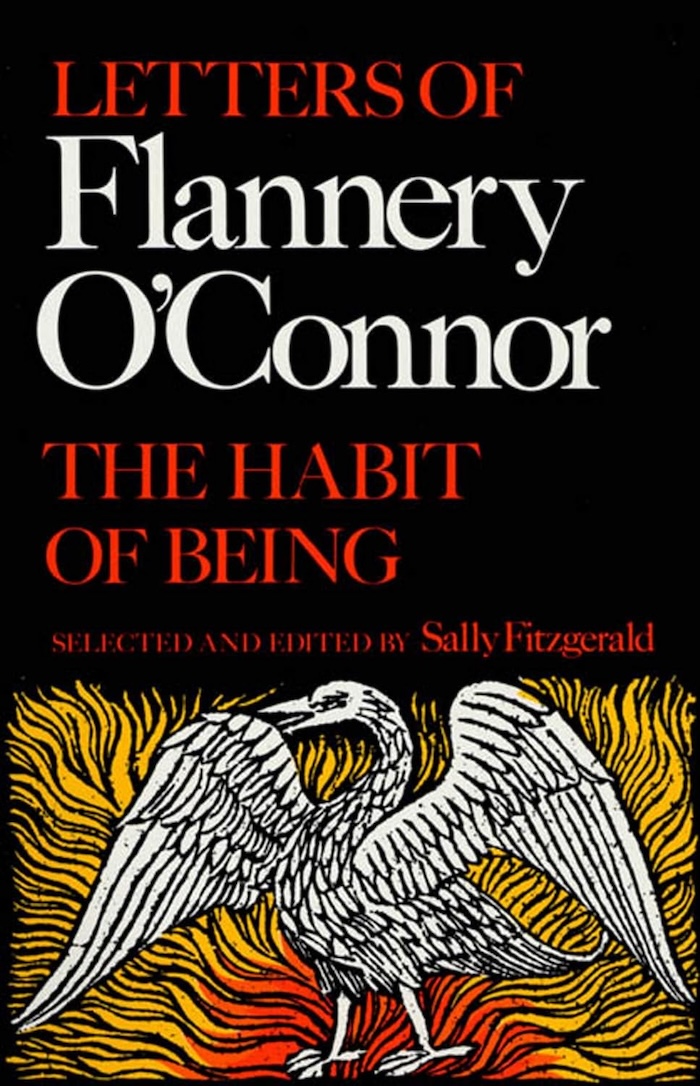From a letter written July 20, 1955: “I write the way I do because (not though) I am a Catholic. This is a fact and nothing covers it like the bald statement. However, I am a Catholic peculiarly possessed of the modern consciousness, that thing Jung describes as unhistorical, solitary, and guilty. To possess this within the Church is to bear a burden, the necessary burden for the conscious Catholic. It’s to feel the contemporary situation at the ultimate level. I think that the Church is the only thing that is going to make the terrible world we are coming to endurable; the only thing that makes the Church endurable is that it is somehow the body of Christ and that on this we are fed. It seems to be a fact that you have to suffer as much from the Church as for it but if you believe in the divinity of Christ, you have to cherish the world at the same time that you struggle to endure it. This may explain the lack of bitterness in the stories.”
From a letter dated August 28, 1955: “[I]f you live today you breathe in nihilism. In or out of the Church, it’s the gas you breathe. If I hadn’t had the Church to fight it with or to tell me the necessity of fighting it, I would be the stinkingest logical positivist you ever saw right now. With such a current to write against, the result almost has to be negative. It does well just to be.
“Then another thing, what one has as a born Catholic is something given and accepted before it is experienced. I am only slowly coming to experience things that I have all along accepted. I suppose the fullest writing comes from what has been accepted and experienced both and that I have just not got that far yet all the time. Conviction without experience makes for harshness.”
— from Flannery O’Connor, The Habit of Being: Letters (Vintage Books, 1979)
Related reading and listening
- Hillbilly Augustinian — Ralph Wood on Flannery O’Connor’s refusal to adapt her fiction to the national temper
- The grotesque and the transcendent — Christina Bieber Lake on why Flannery O’Connor’s readers have to work
- Flannery at 100 — In honor of Flannery O’Connor’s 100th birthday, we have gathered here an aural feast of interviews with O’Connor scholars and aficionados discussing her life, work, and faith. (3 hours, 28 minutes)
- Insights into O’Connor’s development as a writer — FROM VOL. 160 Jessica Hooten Wilson discusses her experience studying and organizing Flannery O’Connor’s unfinished third novel, Why Do the Heathen Rage? (27 minutes)
- Prudence in politics — FROM VOL. 146
Henry T. Edmondson, III talks about Flannery O’Connor’s understanding of political life, which was influenced by a range of thinkers including Aristotle, Thomas Aquinas, Eric Voegelin, and Russell Kirk. (19 minutes)
- Flannery O’Connor and Robert Giroux — FROM VOL. 147 Biographer and priest Patrick Samway talks about the relationship between fiction writer Flannery O’Connor and the legendary editor Robert Giroux. (21 minutes)
- The dangers of the life of the mind — Robert H. Brinkmeyer, Jr., on why Flannery O’Connor encouraged the cultivation of “Christian skepticism”
- Remembering Miss O’Connor — Literary critic Richard Gilman shares impressions of his relationship with Flannery O’Connor
- God is in the details — Flannery O’Connor on why stories rely on the particularities of reality
- The artist’s commitment to truth — Fr. Damian Ference, author of Understanding the Hillbilly Thomist, explores the depths to which Flannery O’Connor was steeped in Thomistic philosophy. (18 minutes)
- Flannery O’Connor and Thomistic philosophy — Fr. Damian Ference explores the depths to which Flannery O’Connor was steeped in Thomistic philosophy, as evidenced by her reading habits, letters, prayer journal, and, of course, essays and fiction. (48 minutes)
- At the trailhead of a long trek — Jessica Hooten Wilson on the discovery of a literary remnant
- Mars Hill Audio Journal, Volume 160 — FEATURED GUESTS:
Jessica Hooten Wilson, Kyle Hughes, Gil Bailie, D. C. Schindler, Paul Tyson, and Holly Ordway
- Art and the truth of things — Joseph Nicolello explains the origins and themes of his imaginary dialogue between Jacques Maritain and Flannery O’Connor. (28 minutes)
- Mars Hill Audio Journal, Volume 147 — FEATURED GUESTS:
R. Jared Staudt, Jason Peters, D. C. Schindler, Craig Gay, Mary Hirschfeld, and Patrick Samway
- Mars Hill Audio Journal, Volume 146 — FEATURED GUESTS:
Mark Mitchell, Hans Boersma, Henry T. Edmondson, III, Brian Clayton, Douglas Kries, Conor Sweeney, and Carole Vanderhoof
- Freedom and equality according to Flannery O’Connor — Three guests discuss Flannery O’Connor’s ideas: Henry T. Edmondson, III, on O’Connor’s understanding of political life; Ralph C. Wood, on O’Connor as a “hillbilly Thomist”; and Susan Srigley, on O’Connor’s sacramental and incarnational fiction. (18 minutes)
- How literature becomes a habit — Flannery O’Connor exhorts English teachers to maintain high standards
- Education as the formation of taste — Flannery O’Connor on the shaping of literary experience
- Hillbilly Thomist: Flannery O’Connor and the Truth of Things — Susan Srigley and Ralph Wood examine Flannery O’Connor‘s sacramental fiction and her understanding of the wisdom of limits. (60 minutes)
- Mars Hill Audio Journal, Volume 73 — FEATURED GUESTS: Richard John Neuhaus, Nigel Cameron, Carlos F. Gomez, Michael Uhlmann, Patrick Carey, John W. O’Malley, Patricia Owen, Susan Srigley, and Ralph C. Wood
- Mars Hill Audio Journal, Volume 40 — FEATURED GUESTS: Joseph Epstein, John Gray, Kenneth R. Craycraft, Jr., William T. Pizzi, Pamela Walker Laird, Albert Borgmann, Neal Stephenson, and Alan Jacobs
